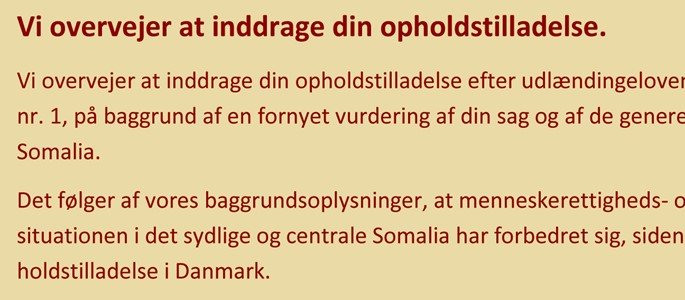Somali refugees are expelled on illegal grounds
Experts accuse Immigration Service of twisting facts
Recently, 34 Somali refugees, including 15 children, have had their residence permits withdrawn, and are now in a position of deportation. But this was done on questionable grounds, says three asylum lawyers and two experts on administration law, whom Politiken talked to (link in Danish). Sentences from Immigration Service’s own fact finding report are being used separately, omitting other parts pointing in the opposite direction. The administration is not allowed to do this.
“Immigration Service is obliged to loyally refer to disputable information, and that there are different assessments of the situation in Somalia. In this case, Immigration Service has not done so,” says expert on administration law Sten Bønsing, Aalborg University.
The same can be said against the 5 trial cases, decided by the Refugee Appeals Board in September 2016, but they were assessed by a judge and a majority and do not fall under the same rules of administration.
Everything indicates that if changes for the better are in fact taking place in Mogadishu, things might very well change for the worse again very quickly – there is no stable and clear movement in a positive direction. But even the weak and disputable improvement is now used with reference to the new law from 2015, opening up for withdrawing asylum permits even if small improvements have taken place. UNHCR has warned Denmark strongly against deporting refugees to Somalia.
800 Somalis residing in Denmark have received a letter warning them that their residence permit will be taken up for reassessment – others have received a reassuring letter that they will keep their status. The first group are being called in these days for a new asylum interview with Immigration Service, where they can explain about individual asylum motives apart form the general risk granting them asylum in the first place. Besides, they must fill out a form about their attachment to Denmark – focusing on Danish language skills, work, education, active participation in society and family.
Among the cases that Refugees Welcome knows about, one man kept his permit because of 5 years of full-time job, and another man lost his in spite of 1 year of unsupported work. In both cases they had been here since 2009 and were granted asylum in 2012, both are fluent in Danish. How long a child needs to be sufficiently attached to Denmark is not clear – normally the authorities will attach importance to whether the child had its “shaping” years here, this meaning from around 5 to 15. So far, it looks like the Somali children did not have a strong enough attachment to stay. Beside the 15 children in the new rejections, there were 10 children in one of the 5 cases who had their permits revoked in the Refugee Appeals Board last year, and they had been in the country for 3 years.
There are two other elements which seem not to have been taken into consideration in the decisions. One is the best interest of the child, which we are obliged to consider according to the Convention on the Rights of the Child. Can it be argued to be in the best interest of the child to be moved from a Danish kindergarten/school to one of the most dangerous countries in the world for children? This is not mentioned in the decisions.
The other issue is whether deportations are in sight at all – it has not been possible for as long as anybody remembers, and there is no agreement with the Somali government. In 2015 there were 151 Somalis in deportation position (latest numbers). In 2015 and 2016 a few single men were deported – a matter kept totally secret both times, and still without a general agreement on return.
This means that the ones who are now loosing their residence permits can prepare themselves to spend years in the deportation camps Kærshovedgård og Sjælsmark, depending on whether they have children or not. Some of them have already stayed for years in other camps until a decision from The European Court of Human Rights in 2011 meant that everybody coming from Mogadishu or central Somalia were granted asylum.
The law of withdrawing asylum permits was passed under the SR government (Helle Thorning-Schmidt) in February 2015, and the Radicals have recently regretted it. But there was no shortage of warnings at the time, i.e. Refugees Welcome wrote a hearing letter which can be read here (in Danish).
More links to Politiken articles on the issue (in Danish):
10 børn er blevet udvist...
Dansk delegation var kun én dag i Somalia...
Somalia-rapport indeholder 20 advarsler...
Hvis jeg bliver dræbt, må det være sådan...
Rigspolitiet mørklægger udvisninger...


